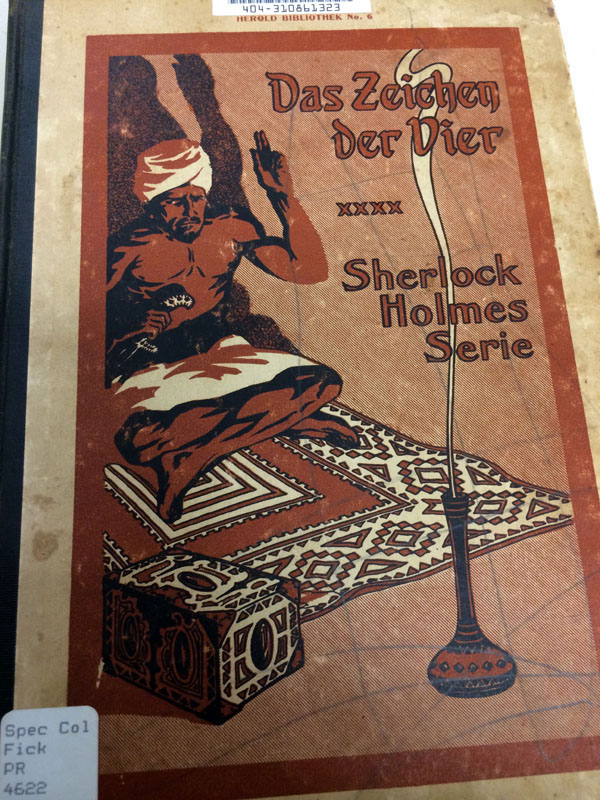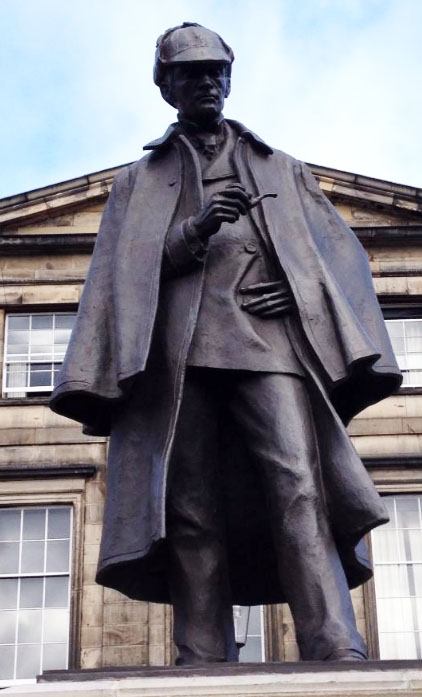By: Iman Said, ARB Intern 2014-2015
This week, we’ll take a quick break from historical photos and talk about the impact that literature can have on society.
Last March, I had the opportunity to travel to Edinburgh, Scotland as part of a seminar here at UC. Edinburgh is the very first city to be established as an UNESCO City of Literature. Incredible authors began their careers in Edinburgh, from Sir Walter Scott to J.K. Rowling. Simply walking the streets of Newtown was enough to see the impact that literature has had on the culture of the city.
For me, the most significant author to start in Edinburgh is the incredible Sir Arthur Conan Doyle, whose legendary consulting detective is a household name all over the world. Sherlock Holmes and his faithful compatriot, Dr. John Watson, got their start in two novels, A Study in Scarlet and Sign of the Four. Neither of the novels had very much success, so Doyle decided to change tactics and began to write a series of short stories that ran every month in The Strand Magazine. The first story, “A Scandal in Bohemia” was published in July 1891 and was an instant success, guaranteeing the success of Doyle and the success of the magazine. Today, the stories have been translated into numerous languages and adapted into tens of television programs, radio shows, and movies. Statues of the great detective can be found in Edinburgh, the birthplace of Sir Arthur Conan Doyle, as well as in Japan and Switzerland.
 Sir Arthur Conan Doyle didn’t just create a fascinating and wildly popular character; he also had significant influence over the how criminal cases were solved. Sherlock Holmes was the first to use forensics to solve a case. In a time where hearsay formed the basis for most guilty verdicts, Holmes analyzed blood splatters, bullet trajectory, fingerprints, and more. He was the first to emphasize the importance of an uncontaminated crime scene during police investigation. A full thirty eight years after the stories were written, the first forensics lab was built by Frenchman Edmond Locard, who came up with the exchange principle, which simply says that when two items come into contact, they each leave a trace on the other.
Sir Arthur Conan Doyle didn’t just create a fascinating and wildly popular character; he also had significant influence over the how criminal cases were solved. Sherlock Holmes was the first to use forensics to solve a case. In a time where hearsay formed the basis for most guilty verdicts, Holmes analyzed blood splatters, bullet trajectory, fingerprints, and more. He was the first to emphasize the importance of an uncontaminated crime scene during police investigation. A full thirty eight years after the stories were written, the first forensics lab was built by Frenchman Edmond Locard, who came up with the exchange principle, which simply says that when two items come into contact, they each leave a trace on the other.
 Sherlock Holmes is just one example of how literature can have a lasting impact on society, and can actually lead to new developments in crucial fields. Here at UC, Michael Atkinson, professor of English and Comparative Literature, received the 1997 Edgar Allen Poe Award for his book, The Secret Marriage of Sherlock Holmes and Other Eccentric Readings, which analyzed the stories and dissected Doyle’s genius. Our own library has a copy of that book, as well as a German translation of the famous story The Sign of the Four, published in 1904. Alongside our copy of The Adventures of Sherlock Holmes, the UC Archives and Rare Books library is home to another spin off, entitled The Adventure of the Discerning Thespian. These books can all be found in the Archives and Rare Books library and they are dying for someone to open their pages.
Sherlock Holmes is just one example of how literature can have a lasting impact on society, and can actually lead to new developments in crucial fields. Here at UC, Michael Atkinson, professor of English and Comparative Literature, received the 1997 Edgar Allen Poe Award for his book, The Secret Marriage of Sherlock Holmes and Other Eccentric Readings, which analyzed the stories and dissected Doyle’s genius. Our own library has a copy of that book, as well as a German translation of the famous story The Sign of the Four, published in 1904. Alongside our copy of The Adventures of Sherlock Holmes, the UC Archives and Rare Books library is home to another spin off, entitled The Adventure of the Discerning Thespian. These books can all be found in the Archives and Rare Books library and they are dying for someone to open their pages.
Sherlock Holmes is one of my favorite literary characters; not only was he passionate, dedicated, and brilliant but he represented an entire shift in the way police investigations are handled. Over a hundred years before forensic science was a commonality, Sherlock Holmes was using microscopes to distinguish between different dirt stains and was developing methods for identifying poisons. He appealed to all age groups, nationalities, and backgrounds and was a true fictional hero.

